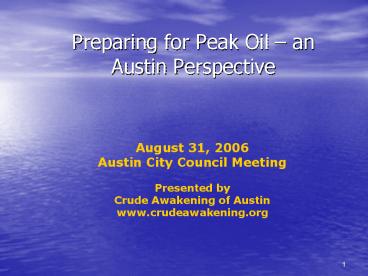Preparing for Peak Oil an Austin Perspective - PowerPoint PPT Presentation
1 / 29
Title:
Preparing for Peak Oil an Austin Perspective
Description:
Austin City Council Meeting. Presented by. Crude Awakening of Austin. www.crudeawakening.org ... directing, and motivating the city and its residents toward an ... – PowerPoint PPT presentation
Number of Views:32
Avg rating:3.0/5.0
Title: Preparing for Peak Oil an Austin Perspective
1
Preparing for Peak Oil an Austin Perspective
August 31, 2006 Austin City Council
Meeting Presented by Crude Awakening of
Austin www.crudeawakening.org
2
Larry Gilg
- Peak Oil Background
3
Maximum oil production occurs when roughly half
the recoverable oil is still in the ground.
- Annual unrestricted production history of a large
field of individual oil wells forms a bell
shaped curve (NOT a rectangle)
- Discovery history
- Well start times
- Well production rates
- Well production durations
4
Hubberts Peak predicted the date of the
beginning of US oil depletion
1 9 5 6
5
Hubberts Peak pinpointed the date for peak of
US oil production
6
Hubberts Line transforms peak into a graph
that shows total recoverable resource
7
The method predicted the peak of the US oil
production
8
World Oil Production Peak prediction
Smoothed Discovery
9
Hubberts Line predicts well reach worldwide
peak oil . . .
now!
2003
2003
10
Nancy Dennis
- Where we are
11
(No Transcript)
12
Crude oil extraction has enabled exponential
population growth.
13
80 of all the worlds oil comes from a few
remaining large fields discovered more than 35
years ago
- Kuwaits Bergan field Peaked 2006
- Mexicos Cantarell field Peaked 2006
- North Sea Peaked 2005
- North Slope (Alaska) Peaked 1998
- Russia Peaked 2004
- Saudi Arabia ???
- NO OTHER SUPER GIANT FIELDS IN THE WORLD
- LAST GIANT/SUPER-GIANT DISCOVERY - 1969
14
The Real Problem of the Oil Peak
Demand Forecast, 1.7/yr Business as Usual
Year
Supply of Conv. Unconv. Oil
15
3.0
1.7
0
16
Susan Gilg
- How does this affect Austin?
17
Oil prices have exponentially increased in this
decade
And are beginning to affect a host of other
commodities
18
Small change in supply
- Reducing the oil supply by 4 will result in 161
/ barrel oil price - Oil Shockwave Scenario
- Recent IEA estimates point to a decrease in spare
capacity from 8.7 mbpd in 1985 to 1 mbpd or less
today.
19
Oil is the main form of energy used in the US
20
How the U.S. Uses Oil
Source US Energy Information Administration -
2003
21
Austins share
- Austins share of US oil consumption 52,226
barrels/day - In the 3 minutes of my talk, that amounts to over
100 barrels of oil - Annual cost to Austin
- At 20/bbl 380M
- At 75/bbl 1.4B
22
High priced oil will affect life in Austin on
many levels
- Cost of goods and services
- Transportation and Social networks
- New economic patterns
- Land use and infrastructure
23
The Real Homeland Security?!
- Analogous to Disaster Preparedness
- Our city needs to be
- Well-positioned for escalating energy prices and
supply disruptions - Committed to using less energy
- Addressing structural issues that lock in energy
consumption
24
John Botti
- What do we do?
25
200 Questions
- Effect on city policies and budgets?
- How can we protect and expand our local
resources? - Food Production
- Water supply
- Local industry
- How to maintain quality of life for all
Austinites? - Access to quality of life for all
- Vitality of the city
- Maintaining pride in community
- Define progress in terms of sustainability
26
What the city is doing right
- Green choice
- Light rail
- Plug-in hybrids
- Energy conservation initiatives
- Solar rebate program
- Smart Growth
- Were ahead lets keep going!
27
What else should we do
- Local agriculture
- Community gardens think victory gardens
- Tax/zoning incentives for local growers
- Community enrichment
- Access to life without a car
- Expand bike paths
- Pedestrian zones
- Support small business local industry
- (keeps jobs and here as well)
28
Next Steps
- 3-Stage Approach
- Adopt an energy depletion resolution
- Workable for Austin
- Parallels Portland and San Francisco efforts
- Our city joins strong partners to lead the way
- Establish an Energy Depletion Task Force to
- Identify areas of vulnerability,
- Identify city infrastructure designs and
initiatives that lock in or encourage the use of
fossil fuels, - Develop and recommend mitigation strategies
- Inform our Citizens and Businesses
- TIME IS OF THE ESSENCE
29
- Designing, directing, and motivating the city
and its residents toward an era of decreasing
dependence upon fossil fuels, as quickly as
possible, should be the prevailing and pervasive
guiding principle in virtually every decision
made by you, and every issue that you address.































